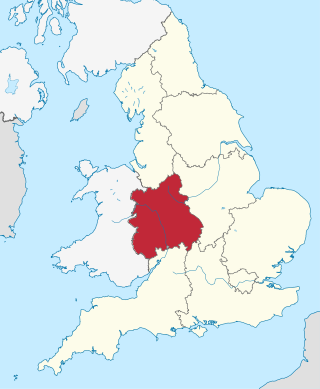
Janet is a high-speed network for the UK research and education community provided by Jisc, a not-for-profit company set up to provide computing support for education. It serves 18 million users and is the busiest National Research and Education Network in Europe by volume of data carried. Previously, Janet was a private, UK-government funded organisation, which provided the JANET computer network and related collaborative services to UK research and education.

The West Midlands is one of nine official regions of England at the first level of International Territorial Level for statistical purposes. It covers the western half of the area traditionally known as the Midlands. The region consists of the counties of Herefordshire, Shropshire, Staffordshire, Warwickshire, West Midlands and Worcestershire. The region has seven cities; Birmingham, Coventry, Hereford, Lichfield, Stoke-on-Trent, Wolverhampton and Worcester.

BBC Midlands is the BBC English Region producing local radio and web content for Herefordshire, Shropshire, Staffordshire, Warwickshire, the West Midlands, and Worcestershire. Although the region has been unofficially called BBC West Midlands since BBC East Midlands became a separate region in 1991, it retains the BBC Midlands name and brand, with its history dating from 1927, for public use.
Access Grid is a collection of resources and technologies that enables large format audio and video based collaboration between groups of people in different locations. The Access Grid is an ensemble of resources, including multimedia large-format displays, presentation and interactive environments, and interfaces with grid computing middleware and visualization environments. In simple terms, it is advanced videoconferencing using big displays and with multiple simultaneous camera feeds at each node (site). The technology was invented at Argonne National Laboratory, Chicago.
The National Learning Network (NLN) was a UK national partnership programme designed to increase the uptake of Information Learning Technology (ILT) across the learning and skills sector in England. Supported by the Learning and Skills Council and other sector bodies, the NLN provided network infrastructure and a wide-ranging programme of support, information and training, as well as the NLN Materials − a substantial range of e-learning content. The initiative began in 1999 with the aim of helping to transform post-16 education. The Government's total investment in the NLN totalled £156 million over a five-year period.

Transport for West Midlands (TfWM) is the public body responsible for co-ordinating transport services in the West Midlands metropolitan county in England. It is an executive body of the West Midlands Combined Authority (WMCA), with bus franchising and highway management powers similar to Transport for London. TfWM's policies and strategy are set by the Transport Delivery Committee of the WMCA.

Jisc is a United Kingdom not-for-profit company that provides network and IT services and digital resources in support of further and higher education institutions and research as well as not-for-profits and the public sector.

The West Midlands Ambulance Service University NHS Foundation Trust (WMAS) is responsible for providing NHS ambulance services within the West Midlands region of England. It is one of ten ambulance trusts providing England with emergency medical services, and is part of the National Health Service.
BBC England is the division of the BBC responsible for local and regional television, radio and web services in England, the Isle of Man, and the Channel Islands. Previously called BBC English Regions, it is one of the BBC's four "nations" – the others being BBC Cymru Wales, BBC Northern Ireland, and BBC Scotland.

BBC North West is the BBC English Region serving Cheshire, Greater Manchester, Lancashire, Merseyside, North Yorkshire, West Yorkshire, Derbyshire, Cumbria and the Isle of Man.

BBC East Midlands is the BBC English Region covering Derbyshire, Leicestershire, Nottinghamshire, Rutland, southern parts of South Kesteven in Lincolnshire and some northern parts of Northamptonshire.
Science Learning Centres are a UK government initiative to address the need for improved science education and development for teachers in England.

EMMAN was a company limited by guarantee and jointly owned by its members, eight Higher Education Institutions in the East Midlands region of the United Kingdom.
The NHS Institute for Innovation and Improvement was a special health authority of the National Health Service in England. It supported "the NHS to transform healthcare for patients and the public by rapidly developing and spreading new ways of working, new technology and world-class leadership".
The Regional Broadband Consortia were created in the United Kingdom in the year 2000 to secure lower prices for broadband connection services for schools by aggregating demand across a region and entering into region wide contracts. They were established under the auspices of what was then known as the Department for Education and Skills (DfES) National Grid for Learning (NGfL) programme.
The city of Birmingham, England is home to an evolving media industry, including news and magazine publishers, radio and television networks, film production and specialist educational media training. The city's first newspaper was published in 1732.

The West Midlands Passenger Transport Executive (WMPTE) was the public body responsible for public transport in the West Midlands metropolitan county in the United Kingdom from 1969 until 2016. The organisation operated under the name Centro from 1990, and was publicly branded as Network West Midlands from 2005.

The Birmingham station group is a station group of three railway stations in Birmingham city centre, England consisting of New Street, Snow Hill and Moor Street. The station group is printed on national railway tickets as BIRMINGHAM STNS and does not include the international station of Birmingham International, which is located some 14 kilometres (8.7 mi) east of the city centre next to Birmingham Airport and National Exhibition Centre.
Counter Terrorism Policing is the national collaboration of police forces in the United Kingdom working to prevent, deter and investigate terrorism in the United Kingdom. The Network is governed by the National Police Collaboration Agreement Relating to Counter Terrorism Activities Made Under Section 22A of the Police Act 1996. The Network is accountable to the United Kingdom Government and the National Police Chiefs' Council Counter Terrorism Coordination Committee which is chaired by the Metropolitan Police Service Assistant Commissioner of Specialist Operations (ACSO) who also acts as the National Lead for Counter Terrorism Policing. The Network is also functionally coordinated by two Senior National Coordinators who are usually Metropolitan Police Service Deputy Assistant Commissioners co-located within the Counter Terrorism Command.










